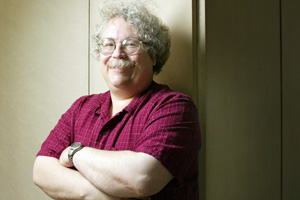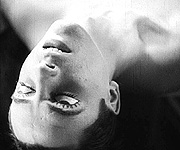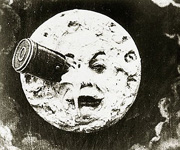Mellon grant supports closer look at moving images’ history
By Josh Schonwaldjschonwa@uchicago.edu
News Office
 Photo by Jason Smith Tom Gunning |
|
Thomas Gunning, one of the nation’s leading film historians and theorists, will explore the historical and aesthetic context of the moving image with the support of a Distinguished Achievement Award from the Andrew W. Mellon Foundation.
The three-year award, given annually to distinguished scholars in the humanities, provides as much as $1.5 million to the recipients and their institutions in order to deepen and extend humanistic research. In contrast to other notable awards that benefit individuals exclusively, the Distinguished Achievement Awards are designed to recognize the interdependence of scholars and their institutions. They not only recognize a scholar’s work, but also support programs that enhance scholarship and teaching related to the recipient’s interests.
In announcing the award on Friday, March 13, the Mellon Foundation recognized Gunning as “a historian and theorist of early cinema who has redefined the historiography of film.” He also was cited as “an influential analyst of film and modern media in their relation to cultural history and theory,” who has connected them to the arts, the sciences and the humanities overall.
Gunning, the Edwin L. and Betty L. Bergman Distinguished Service Professor in Art History and the Chair of Cinema & Media Studies, is the fourth Chicago scholar to receive the award, which has been given since 2001.
 From Jean Cocteau’s 1930 avant garde film Le Sang d’ un Poete (The Blood of a Poet). |
|
 From Georges Méliès’ 1902 film Le Voyage dans la lune (A Trip to the Moon). |
|
“The Division is extremely proud of Tom but hardly surprised,” said Martha Roth, Dean of the Division of the Humanities and the Chauncey S. Boucher Distinguished Service Professor of Assyriology in the Oriental Institute and Near Eastern Languages & Civilizations. “Tom is a consummate scholar and an exceptional colleague. His work is helping to define film studies; it is a wonderful example of the critical, interdisciplinary approach we esteem at Chicago.
“To have him join the distinguished cohort of Chicago Humanities scholars to have received this award is a profound affirmation, not only of Tom, but of the unyielding intellectual standard we set in the Division.”
Gunning added that an award of this nature does more than enable projects. “It’s tremendously exciting. It’s allowed me to think through the shape of a lifetime of research, to think about what issues and questions have driven my work to this point and what trajectory that work might ultimately take. I am appreciative as much for this occasion of self-reflection as for the material support offered.”
Gunning said one of the chief aims of his project, titled “Poetics of the Moving Image,” is to “overcome historical amnesia in thinking about the evolving state of media.” As a historian and theorist, Gunning said his goal is to “unite theoretical speculation about the present and future state of the moving image with a broad historical perspective.”
He will focus on several specific subjects. In one piece of the project, he will focus on cinema’s origins in the development of optical magic. In the 19th century, innovators developed a form of theatrical magic that used new optical technologies to enable, for instance, appearances and disappearances on stage. One of the most successful directors of early narrative motion pictures, Georges Méliès, came from a magical theatre tradition.
In another part of his project, Gunning will explore the intersection of the moving image in film with the poetic image in literature, investigating artists who were both poets and filmmakers—for example, Jean Cocteau, Robert Desnos and Antonin Artaud all worked on films that inspired cinematic poetry.
Other pieces of the sweeping project include a survey of the history and stylistics of the detective genre in film; an exploration of the relationship between the moving image and the experience of uncanny events; and a close examination of the use and meaning of scientific footage, not conceived primarily as aesthetic, in films.
While these topics are diverse and specific, Gunning said they all converge and by selecting this group of topics, the moving image can be explored in its historical and aesthetic context.
In addition to supporting his work, Gunning plans to use the Mellon Foundation grant to subsidize a wide variety of activities related to the project, including archival research, a visiting professorship, graduate student research, public conferences on such topics as “Cinema and Magic” and “The Optical Uncanny,” as well as performances. He expects to coordinate conferences in conjunction with screenings and performances, with participation by theater directors, actors, performers and videomakers and installation directors.
A member of the Chicago faculty since 1996 and a 1998 John Simon Guggenheim Foundation fellow, Gunning is the author of more than 100 works on film history, culture, style and interpretation. His book, D.W. Griffith and the Origins of American Narrative Film: The Early Years at Biograph (1991), won the 1992 Theater Library Association Award, and his 2000 book, The Films of Fritz Lang: Allegories of Vision and Modernity, was named an outstanding academic book by Choice: Current Reviews for Academic Libraries.
Other Chicago faculty who have received the Mellon award are Robert Pippin, the Evelyn Stefansson Nef Distinguished Service Professor in the John U. Nef Committee on Social Thought and the College; Sheila Fitzpatrick, the Bernadotte E. Schmitt Distinguished Service Professor in History and the College; and Philip Gossett, the Robert W. Reneker Distinguished Service Professor in Music and the College.
![[Chronicle]](/images/sidebar_header_oct06.gif)